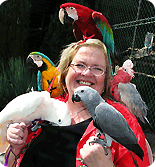Techniques to stop egg laying in a Sun Conure

Last week, my eight year old sun conure, Rainbow, recently laid two eggs. I am a first-time parrot owner, and we’d always assumed she was a male, so this was surprising for her human flock-members. But more pertinently: the eggs were soft—they crumpled. Clearly, there were some issues with what I was feeding her! She’s always had access to a wide variety of fresh veggies and fruits, cooked food, seeds, and pellets. But I note now how she really favored the seed, and favored the safflower seeds in the mix over everything else. She has remained healthy, active, hungry, and
affectionate.
Here’s what I’ve done:
—consulted an avian vet, who kindly explained the cause of the soft eggs, but said that unless she was sitting on the bottom of her cage, fluffed up and immobile, I needn’t bring her in. Sheesh.
—constructed a nest with dummy eggs and the ones she laid. She has little interest in the nest; her only interaction with it was to cover the eggs with nesting material. She does not sit in the nest or attend to it; I plan to remove it in a few weeks after the usual incubation period has elapsed.
—began adding Quiko daily multivitamin to her water. She also has access to pure water; she prefers the multivitamin. Do you have a recommendation for a really high-quality supplement of this sort?
—put 1/8 tsp. powdered bone meal in some of her warm foods, in addition to making sure her fresh diet has a better showing of calcium-rich foods: veggies like broccoli and collard greens; scrambled egg with shell; almonds and sesame seeds. But how much calcium is too much? Should I be feeding it in correlation with other foods that help with the absorption of it?
—put her pellets and seeds in different dishes, so I can monitor what she’s eating of what. Also, began offering only a small amount of seed once a day (but didn’t want to cut that out all at once), to which she has responded by eating a larger variety of other foods.
—changed the location and arrangement of her cage, and some of the toys
—began covering her for the night earlier, so she’s getting close to 12 hours light/12 hours dark
—ceased to allow any regurgitation behaviors with me, her primary caregiver, and started emphasizing flock time with the whole family (which is a small little flock—just two humans and her!).
Perhaps as a result of these changes, perhaps not, she has ceased to lay eggs. With all that background in mind, here is my primary question: are these the appropriate things to be doing for her right now?
Also, what is a really good resource for information on the species-specific sun conure diet? I am curious about the digestive system, and the reproductive system, of these marvelous creatures who are so
different from, well, mammals. In short, I'd like to learn more about psittacine physiology and health, but don’t know where to start. What should I read?
Thanks!

Thanks for this great and timely question! Spring time often, with increased daylight hours, increased reproductive activity in wild birds and the plentiful food we give our parrots, will stimulate egg-laying in our companion birds. I have had many a caregiver discover that their male parrot is, indeed, a female when they are surprised by an egg.
Egg laying is a tremendous metabolic drain on our parrots’ bodies; they are not chickens! Plus, birds can develop serious reproductive and metabolic diseases from repeated egg-laying. You have already followed most of my recommendations for controlling this process with Rainbow. If 70% or more of the bird’s diet is a high quality pelleted diet, I normally do not advise calcium or other supplementation, but always follow the specific recommendations of your bird’s veterinarian. I prefer to supplement calcium with foods (as you are already doing) and not bone meal, so I do not worry about oversupplementation. Fresh foods fed are primarily sprouted seed and veggies, with smaller amounts of fruit. Seeds and nuts are less than 5% of the daily ration and are used only in teaching/training, only given by hand (not in the food bowl) as special treats. Reducing the fat levels in the diet, decreasing daylight hours and removing toys and/or petting which is sexually stimulating will generally reduce egg-laying. I advise removing the eggs as they are laid, especially with birds who show no interest in the eggs. Occasionally, it is better to leave eggs with those individual birds who sit on them.
With over 350 species of parrots in the world, there is obviously much to learn about specific dietary requirements. Much of the current information regarding psittacine nutrition is anecdotal and unreliable. Research is currently being done in several species. There are some excellent articles on health and nutrition in the World Parrot Trust’s online reference library. Another reliable online resource is at http://www.wingwise.com.
You have already done some good research; I applaud your willingness to provide the best care for Rainbow!
Ellen K. Cook, DVM

































